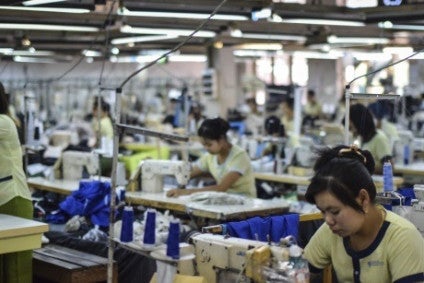
New estimates released by the International Labour Organization (ILO) this week show that enterprises and the jobs of workers in key sectors in Myanmar, including the garment industry, are being affected by the military coup, and in the wake of the pandemic.
The ILO estimates that 1.1m fewer women and men are employed compared to 2020, which indicates a small recovery in jobs in the first half of 2022. However, employment remains well below 2020 levels while the quality of jobs is deteriorating. Women are also more affected than men overall.
In the garment industry, evidence points to an increase in casual or daily labour, irregular working hours and workers receiving lower pay. ILO research also shows that more widely, entitlements such as severance pay when workers’ jobs are terminated are also often not granted.
“Eighteen months on from the military takeover, the employment situation in Myanmar remains very difficult. While there are limited signs of job growth, the ongoing erosion of labour conditions and the decrease in job quality is deeply concerning,” says Donglin Li, ILO Myanmar liaison officer.
In the first half of 2022, labour productivity contracted a further 2%, adding to an 8% contraction in 2021, reversing the strong gains that had been made in years prior to the military takeover.
Labour conditions are deteriorating for many workers with serious violations of labour rights as referred to in decisions of the ILO Committee on Freedom of Association, ILO Governing Body and in the International Labour Conference Resolution of 2021.
How well do you really know your competitors?
Access the most comprehensive Company Profiles on the market, powered by GlobalData. Save hours of research. Gain competitive edge.

Thank you!
Your download email will arrive shortly
Not ready to buy yet? Download a free sample
We are confident about the unique quality of our Company Profiles. However, we want you to make the most beneficial decision for your business, so we offer a free sample that you can download by submitting the below form
By GlobalDataMyanmar remains deeply affected by heavy job losses 18 months after the military takeover on 1 February 2021 and two and a half years into the global pandemic, the ILO says.
A new report published last month suggests global apparel brands sourcing from the country need to exit as they are failing to protect garment workers from the ongoing threat of widespread human rights abuse.
Statistics released by the Office of Textiles and Apparel (OTEXA) back in March showed Myanmar was becoming a less attractive sourcing destination given the political unrest within the country. However, the Business & Human Rights Resource Centre’s new research claims only two companies – Tesco and Aldi South – have exited the country despite what it describes as calls from local and international unions for international brands to withdraw “until democracy is restored”.
In further research, the BHRC said wage theft, gender-based violence and harassment, inhumane work rates and mandatory overtime are just some of the abuses Myanmar’s garment workers are dealing with.
Meanwhile, global unions have been calling on the European Union (EU) to suspend the Everything But Arms (EBA) agreement with Myanmar, given the garment industry remains “a vital source of foreign exchange” for the regime. Yet a spokesperson for the Commission to Just Style that any such action would, in fact, impact “hundreds of thousands” of garment workers, harming the wrong people and hardly affecting military interests.







